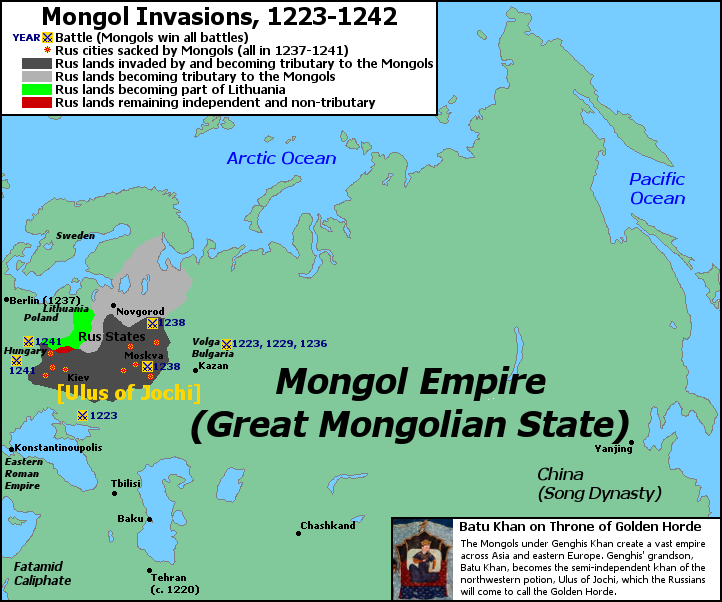

Mongol Invasions, 1223-1242
Batu Khan on Throne of Golden Horde
The Mongols under Genghis Khan create a vast empire across Asia and eastern Europe. Genghis' grandson, Batu Khan, becomes the semi-independent khan of the northwestern potion, Ulus of Jochi, which the Russians will come to call the Golden Horde.
Comments
Disaster for the Rus
The Mongols raided Rus lands and nearby areas in the 1220s. They decimated a Rus army of several Rus princes but then withdrew to pursue conquests elsewhere. In the 1230s, they returned, intent on outright conquest of the entire region. Neighboring Volga Bulgaria was overrun in 1236 and Kievan Rus was next. The Mongol armies and generals were experienced and proficient, ranging from their highly-mobile cavalry to siege engines storming fortified cities. They also used terror to intimidate their enemies. Soldiers of defeated armies were often killed or tortured while defeated princes were crushed under feasting platforms, so that the Mongols could execute them while not (directly) shedding their blood. The Mongols used their reputation for brutality to demand that lands and cities surrender to them, or else. Cities that resisted were looted and burned, with many of their people being slaughtered or enslaved.
Kievan Rus had split up into several competing principalities, but many of the princes cooperated together to fight the Mongols. However, they lost all their battles against the Mongols, and resisting cities were sacked and burned. Novgorod in the north was spared because it surrendered as the Mongols advanced on it. Unlike the 1220s, the Mongols this time did not withdraw but remained as conquerors.
This disaster of the Rus was not just limited to the Mongols. In the west, Lithuania was a rising power and took advantage of Rus weakness to conquer the western Rus lands. By the early 1240s, only a small sliver of Rus lands was neither conquered by the Mongols or Lithuania nor tributary to the Mongols (although these lands later became part of Lithuania for a long time). According to legend, this is the origin of the Belarus lands and the Belarusians as a people distinct from the other Rus: Belarus was White Rus, free from the Mongols, as opposed to Black Rus, which were Rus lands that had to pay tribute to the Mongols.